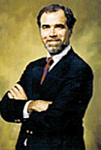The Volunteer Who Was a Pioneer in the Peaceful and Practical Uses of Outer Space — T. Stephen Cheston (Colombia)
A Profile in Citizenship
by Jeremiah Norris — Colombia, 1963-65
•

Steve Cheston
Following his graduation from Clark University in 1963, T. Stephen Cheston, Steve to his friends, served as a Peace Corps Volunteer in Colombia through 1965 where he developed agricultural cooperatives. He worked in a small village with often illiterate campesinos. But with his superb command of Spanish since childhood when he lived in Brazil, Argentina and Mexico where his father worked for U. S. Steel, Steve’s easy and outgoing personality led him to use his Volunteer time for the accomplishment of mutual goals in a productive manner.
After his return from Colombia, he began graduate studies at Georgetown University in 1966, while concurrently working as a volunteer in the Senate Office of Robert F. Kennedy. In 1972, he was awarded a Ph. D. in Russian and Latin American History. In the period from 1972 to 1983, he held consecutive posts at the Georgetown as: Assistant Dean; Associate Dean; Research Professor; and Acting Dean of the University’s Graduate School. He served with distinction in each of these senior academic posts as one of the University’s youngest faculty members.
In 1974, in what soon proved to be prescient testimony before Congress, Steve outlined the national importance of viewing space as a frontier for all people to explore and ultimately settle. From that point onward, public participation in the concepts of space use were no longer in the exclusive domain of a technological elite but evolved and broadened consistently into a more democratic perspective for society at-large.
While at the University, Steve developed an early interest in the possibilities of expanding space exploration to include a broad spectrum of activities associated with human migration and settlement. In 1979, he was the Co-Editor of several scientific publications, including the Space Humanization Series, followed by Human Factors of Outer Space Production in 1980, and Social Sciences and Space Exploration, published in 1984.
In 1983, Steve left Georgetown University to devote his creative energies full time to the emerging potentials he envisioned for the commercial application of satellite communication technology. Along with Princeton University’s noted space scientist, the late Dr.Gerard O’Neil, they became founding members of the Geostar Corporation in New Jersey. Steve served alternatively as Executive Director for Government Affairs; Director, Strategic Development for Latin America; and Vice Chairman, Board of Directors.
In 1991, he joined Motorola Inc’s satellite division as Director for Strategic Development in Latin America. In 1993, he then joined Motorola’s spin off company for space telecommunication in a newly formed company called Iridium, as Director for Intergovernmental Affairs.
As the space telecommunication industry grew, Steve was increasingly drawn into numerous extracurricular activities which promoted new age concepts among wider and more diverse audiences. He served as Director of the Space Studies Institute in Princeton, New Jersey, and was the founder of the Institute for Space Studies in Fairmont, West Virginia. He also served as the U. S. Delegate to the UN International Telecommunication Union’s World Radio Conference in 1994. Steve held the post as a Scholar Diplomat with the U. S. Department of State and was active with the FCC’s Industry Advocacy Committee.
Steve was present—and always contributing, at the creation of almost all of the significant new space organizations arising in the mid-1970s. He became the person in Washington whose judgment guided a new generation of entrepreneurs, policy makers, and academics.
Sadly, Steve died of cancer August 6, 1997.
Steve, in a life of meaning and purpose, saw in the dawn of a new age enormous possibilities for common participation. In his moment of time, he acted decisively on that perspective and in the process made a lasting difference for the benefit of future generations. In a fitting testimony of his significant contributions for the peaceful uses of space, along with his scientific partner, Dr. O’Neil, their ashes were sent into global orbit via the Celestis service. Now, these two pioneers of the modern space age are symbolically linked and honored as they travel through the heavens together.
There is a timeless proverb that goes like this: “you should live your life so that your friends can defend you — but never have to.” That defined Steve’s all too brief time with us on planet earth, earning him a most deservedly Profile in Citizenship.
No comments yet.
Add your comment